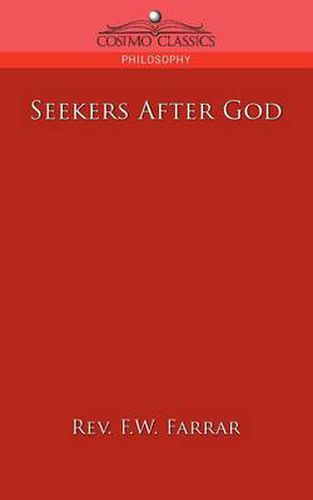Readings Newsletter
Become a Readings Member to make your shopping experience even easier.
Sign in or sign up for free!
You’re not far away from qualifying for FREE standard shipping within Australia
You’ve qualified for FREE standard shipping within Australia
The cart is loading…






This title is printed to order. This book may have been self-published. If so, we cannot guarantee the quality of the content. In the main most books will have gone through the editing process however some may not. We therefore suggest that you be aware of this before ordering this book. If in doubt check either the author or publisher’s details as we are unable to accept any returns unless they are faulty. Please contact us if you have any questions.
The absolute silence of Seneca respecting the woman who had caused him the bitterest anguish and humiliation of his life is, as we have remarked already, a strange and significant phenomenon. It is clearly not due to accident, for the vices which he is incessantly describing and denouncing would have found in this miserable woman their most flagrant illustration… -from Seneca’s Recall from Exile In this uncommon book, first published in 1890, one of the most prolific British writers on theology of the late 19th century offers a full account of the lives and thinking of three great heathen philosophers Epictetus and Marcus Aurelius, whom Farrar deems the most clear-sighted moralists among ancient philosophers [and] with the single exception of Socrates, the best and holiest characters presented to us in the records of antiquity ; and Seneca, because in him we can best study the inevitable signs which mark, even in the works of men of genius, a degraded people and a decaying literature. Imperious and forthright, this self-assure work is an intriguing read for those interested in philosophy, ancient history, and Christian metaphysics. British theologian FREDERIC WILLIAM FARRAR (1831-1903) was chaplain to Queen Victoria from 1871 to 1876. Among his many works are The Life and Works of St Paul (1879) and The Early Days of Christianity (1882).
$9.00 standard shipping within Australia
FREE standard shipping within Australia for orders over $100.00
Express & International shipping calculated at checkout
This title is printed to order. This book may have been self-published. If so, we cannot guarantee the quality of the content. In the main most books will have gone through the editing process however some may not. We therefore suggest that you be aware of this before ordering this book. If in doubt check either the author or publisher’s details as we are unable to accept any returns unless they are faulty. Please contact us if you have any questions.
The absolute silence of Seneca respecting the woman who had caused him the bitterest anguish and humiliation of his life is, as we have remarked already, a strange and significant phenomenon. It is clearly not due to accident, for the vices which he is incessantly describing and denouncing would have found in this miserable woman their most flagrant illustration… -from Seneca’s Recall from Exile In this uncommon book, first published in 1890, one of the most prolific British writers on theology of the late 19th century offers a full account of the lives and thinking of three great heathen philosophers Epictetus and Marcus Aurelius, whom Farrar deems the most clear-sighted moralists among ancient philosophers [and] with the single exception of Socrates, the best and holiest characters presented to us in the records of antiquity ; and Seneca, because in him we can best study the inevitable signs which mark, even in the works of men of genius, a degraded people and a decaying literature. Imperious and forthright, this self-assure work is an intriguing read for those interested in philosophy, ancient history, and Christian metaphysics. British theologian FREDERIC WILLIAM FARRAR (1831-1903) was chaplain to Queen Victoria from 1871 to 1876. Among his many works are The Life and Works of St Paul (1879) and The Early Days of Christianity (1882).